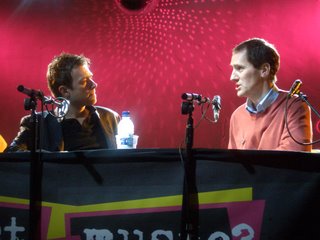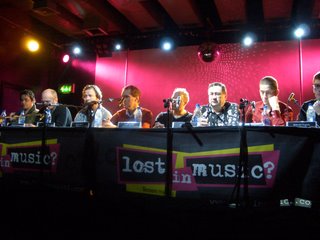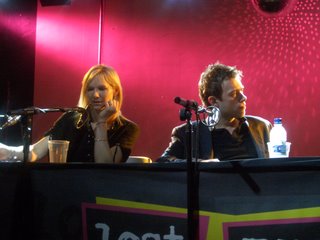This is a summary of the Lost in Music 2 seminar at the Scala on Saturday 24 February 2007, which I'd mentioned recently. There were some great tips for people wanting a career in the music (or indeed any) business, and also some very interesting observations about the future of music, DRM and filesharing. For those who missed it, there will be a podcast of the event, the organisers say later this week - watch this space.
I didn't think I'd be free to go but I managed to sort something out and made it there in the end. It was incredible value for money at a mere £10 per ticket (including sandwiches and fruit for lunch which were tastier than what my workplace serves up, at least!). In fact it was sold out, although only about half the people actually turned up on the day (which was odd, even with the problems with the Northern Line at King's Cross that day). I gather Lost in Music 1 took place some 15 years ago, so it's certainly about time they held another.
Organisers Tenon Media are accountants and business advisers. Clearly via this seminar they'd like to be able to sign up budding artistes, or at least raise their profile amongst musicians, singers and other creatives in the music industry, and then hopefully share in their future success, by being generally helpful to them in the early stages and also making them aware of business and financial issues. And I say, all power to them - the seminar really was excellent.
They mustered a very impressive lineup of music business professionals to give their advice and tips and answer audience questions. There was an obvious Damon Albarn / Blur / Gorillaz / The Good, the Bad and the Queen connection - not only did Damon Albarn turn up for a half hour interview with influential Radio 1 DJ Jo Whiley (both pictured above, the interview will also be in the podcast), but also many of the panel had worked with Blur, and Dave Rowntree of Blur (and the Ailerons) was on the panel too. But that isn't surprising given the close relationship between Blur and Tenon Media. Apparently their MD Julian Hedley pretty much saved Blur's bacon when, despite their musical success, they were on the brink of financial bankruptcy because of the way their affairs had previously been run. I'd be grateful to him too!

Damon Albarn and Julian Hedley
The seminar covered getting started, your rights, the future of music in the digital age, financial management and what to do after getting the deal. I won't go into detail as the podcast should be out soon (and is well worth a listen if you're thinking of making it in the music business). I'm just going to mention what seemed to be the top tips, and also some comments on the future of music which I thought might be of interest to those who, like me, are interested in the impact of technology and the Net on entertainment and the media.
How to succeed in the music business: top tips and hints
Most of this is common sense really, and would hold true for success in any business, not just music - but they bear repeating, certainly when they've been emphasised by so many music industry movers and shakers. They were aimed mainly at musicians (the vast majority of attendees were musicians or vocalists - about half bands, half solo artistes - with only the odd manager or songwriter there). Here's a summary of their howtos and hints:- To paraphrase Damon Albarn: you must have balls and determination, don't get depressed, and if you do get depressed write it into a song!
- You have to have great songs and image, and good promotion.
- Have total self-confidence. Believe in yourself unshakably and you'll carry others along with you; if you don't have faith in yourself, why should anyone else?
- Music industry people are very busy, they get huge piles of CDs and emails all the time. They usually don't have time to listen to every single one of them and they generally won't unless they've had a referral or recommendation from a contact (especially with MySpace links).
- There's too many others out there competing for their attention. You have to be different, make yourself stand out, be noticed, be memorable (but in a good way), to get them to listen to your demo. Be nice, be pleasant, be amusing, explain why you're different. Don't be a nutter, remember no one wants to work with divas (and the music business is a small world, word will spread). If someone says they don't like your work don't throw a tantrum; get their feedback, find out why, ask if they know someone else in the industry who might like it, try them instead.
- Don't just email or post or leave your demo or Myspace link. Do your research. Find out who might be interested in your genre of music, phone, ask to speak to them, or talk to them in person (find out where they'll be and be there). The personal touch makes a huge difference - a handwritten letter, press release etc.
- Don't forget to include your contact details!
- Be politely persistent in pestering them, follow up. Be blunt, be direct, even cheeky (in a nice way!). Make them listen to your demo in your presence if you can. Do whatever it takes to get your music heard. Personal contact always helps to get their attention. Wine and dine them if you can.
- Similarly, your manager should be likeable but persistent. Some don't believe in management contracts, certainly if you can't work together (anymore) having a contract won't make any difference. Consider a trial period? The standard manager's cut in the UK is 20% of the net revenue, by the way.
- It's a team effort - artistes, managers, record companies, pluggers etc. Everyone wants to be part of a successful team. Make them feel yours will be. Make all of them, each person in the record company that's releasing your music lowly or high, each music journalist, promoter etc, feel part of it, feel they're involved, feel that they were the one who discovered something new and special. Make friends with them, make them tea, bring them coffee!
- Follow expert advice. If a plugger advises editing e.g. cutting or speeding up a song for radio play, don't be precious about it and refuse. Work with booking agents on devising a live strategy. Don't forget press agents too.
- Record companies are relying on smaller and smaller groups of artists to support the other artists (and the companies!). It's increasingly difficult and expensive to promote new acts and record companies don't have the time or resources to do the kind of micromarketing and promotion which now seems necessary. The more you can do yourself in the early stages - building up your own initial fan base etc - the more attractive you will be to them and the more likely you are to succeed. You ought to achieve the first 10,000 yourself, the record companies' role is in the tens of thousands and beyond. Create a buzz, stimulate conversation, recommendations, referrals.
- Remember, it's the music business. People are in it to make money. They have to see an opportunity to generate revenue from you, or they won't be interested. And in negotiating deals, record companies will want to get as many records as possible from you, for as long as possible for as little as possible; though bands are increasingly having their own managers and lawyers etc to fight their corner too.
- Look after your finances. Get a lawyer and an accountant and a manager, they can cross check each other effectively, you'll be less likely to be ripped off unless they're all in it together! (this from Dave Rowntree).
- Myspace - mixed views. You probably ought to have a page there and maybe not even bother with your own separate website. Contact promoters, leading bands etc in the same genre and ask to support them. But only if they're a good fit, and ask politely, etc, see above! Myspace may be more convenient for some to listen to, but CDs can do a band more justice, and it could be disastrous if the link doesn't work. Give them what they want. If they ask for a CD, don't just tell them "It's on MySpace". If they want an email link to your demos, give them that.
- It doesn't sound like it's worth setting up your own label, you can sell CDs without it.
- Decide if you're a live band or a studio band. Live gigs are important in terms of building up a fan base and getting attention.
- Don't forget music is increasingly international. You may do better playing in Eastern Europe. Get fans from Japan.
- There's an excellent book which everyone in the industry seems to use as a resource. I couldn't quite catch the name but I think it's "The Music Management Bible", and it explains all sorts of aspects of the music business, including technical and legal, in plain English.
- Network, network, network!

Tim Medcraft, Alasdair George, Dean Marsh, Julian Hedley, Adam Barker, Jon Webber, Mike Smith, Mal Fogarty
Other points
- CDs - it's good to produce CDs to sell at gigs (as opposed to trying to distribute them to record stores, which is very hard if you're not with a known record label). People are willing to buy them after a good gig, it's many bands' primary source of funding. Albums are better than singles, they cost the same to copy and you can have a bigger markup on them e.g. price them at £8. Don't forget to include your Myspace or Web address on them.
- Join the PPL - it's free to join, they pay record companies and performers when their music is played on TV or radio, they administer ISRC codes which you need to get your music stocked on iTunes etc.
- EP or album etc? - doesn't seem to matter, if they like it they'll cover your music, promote it, etc.
- Bands - if you join the Musicians Union they have standard contracts for sharing profits etc between band members, which you can use.
- Your rights - there was a run through of the kinds of income e.g. mechanical income, performance income, the different socieits like the PRS, MCPS etc, but for time reasons it really was a canter through. It sounded useful but I'll have to listen back to the podcast to get it all!
- Work every day - Damon Albarn thinks every songwriter should have a 4-track (he says he still doesn't know how to use a digital one!) and work on writing every single day, even if you get no output for 10 days. I've heard novelists say much the same thing too.

Dave Rowntree, Julian Hedley, Stephen Taverner, Kathy Johnson, Dave Newton
The future of music, the impact of the Net, DRM, filesharing
Some observations on the future of music, technology etc, in no particular order.Maybe I misheard. The podcast will confirm. But I swear I heard Mike Smith, managing director of the UK division of major label Columbia Records, say that he felt DRM should be got rid of! (DRM is digital rights management, which stops people from ripping CDs and copying and sharing or transferring audio files freely). There was also some discussion of Steve Jobs' now notorious suggestion that digital rights management should be abolished, which people variously ascribed (cynically, but I suspect accurately) to the fact that Apple with iTunes have the sale of music by download virtually sewn up, they want to be able to sell across Europe (who are increasingly anti-DRM), and it's no coincidence that Jobs said what he did in the year when Microsoft are launching Zune, their rival to the iPod and iTunes.
Filesharing is on the increase, but the live music scene is booming. Home taping didn't kill music, it increased demand for it, and the same is happening here. People will be consuming music through their mobiles, trading them too, and Mike Smith could foresee a time when you send a file through your mobile to a friend, you get 2p for doing it, they pay 30p for it.
The gap between A&R and marketing is shrinking. Record companies are increasingly working with e.g. brands, sports etc. There will be consolidation of the major labels in the next few years. CDs will die, but not yet. Independent consultant Alasdair George said CD sales are falling, digital sales rising, but not quickly enough to plug the income gap for record companies, who will be trying to find more sources of revenue from new areas e.g. share of live income, merchandising etc, investing (and expecting a return from) more aspects of the artists (and Mal Fogarty of Frukt pointed out that fans wanted to be involved in more and more aspects of the creative process too, not just physical CDs and artwork but backstage, videos, forums etc). But artists' traditional mistrust of major labels may provide independent labels with an opportunity here. Record companies might even shift to just having rights for a few years after an album was made.
Jon Webber of the BPI said that with people increasingly wanting instant gratification - hear a track, buy it, not the album - plus iTunes' sales of music by tracks rather than albums, there was a move towards tracks. Mike Smith also thought there was a move to a song by song basis.
There perhaps should be variable pricing too, Tim Medcraft of Bucks Music Group thought.
And as an aside, in terms of great use of technology, I was interested to hear that Dave Newton of Shifty Disco and wegottickets.com has a special A&R server where bands upload their music, and he just listens to the stream, rather than having to change CDs or click email links.
All in all, a very interesting and constructive day.
Tags:

4 comments:
This is a great write up of this event. Also recently, Fast Company had a panel with music artist John Legend, the CEO from musictoday and the viral marketer from OK Go. Some of these same points about the Future of Music were made here. Go to http://www.fastcompany.com/video to gain more insight.
Thanks for your comment Lynne. The video looks interesting, will check it out when I get a chance.
Hey! In trying to navigate the music industry, I thought you and your readers might be interested in this contest....
TuneCore is teaming up with Guitar Center to do a contest we're opening up to indie artists across the country. It's kinda cool - the winning band gets a tour van, lots of cash and a case of ramen to boot! Let me know if you need any more info - details are below. Thanks!
-Mary
In a Band? Win a Van!
Upload Your Music And Hit The Road
TuneCore In Collaboration With Its Strategic Partner Guitar Center To Give Away Complete Tour Kit: ‘07 Ford Econoline, $5000 Cash, Apple Macbook, Year Of Internet Access, $500 Gas Card And Case Of Ramen Noodles
TuneCore, which allows musicians to quickly, cheaply and easily upload their music to iTunes, Rhapsody, Napster and eMusic and many more understands the necessity of touring and the resources needed to go on tour.
To enter, bands can go to http://www.guitarcenter.com/winavan during the month of June and submit the following information:
• How your band could benefit from a new ride
• Your best tour story or best tour story of the future
• 10 things your band would always have in the van
• The dedication of your band members to its craft
http://www.tunecore.com
Mary Barbour
TuneCore
Marketing Manager
Hi Mary, I'm based in the UK so I'm not sure how many of my readers would be interested, but thanks for the info anyway.
Post a Comment